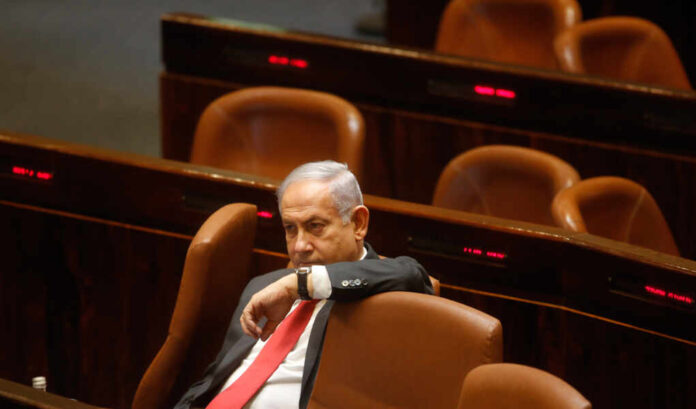
Twenty Israeli hostages held by Hamas in Gaza are confirmed alive as Prime Minister Benjamin Netanyahu pushes international diplomatic efforts to secure their release, while also maintaining his stance on Israel’s broader war objectives.
At a Glance
- Prime Minister Netanyahu confirmed 20 Israeli hostages in Gaza are alive, with a total of 58 hostages, both living and dead, believed to remain in captivity
- Diplomatic negotiations for hostage release are ongoing through mediators in Egypt and Qatar, with U.S. Special Envoy Steve Witkoff participating
- Israeli-American soldier Edan Alexander was recently freed after 584 days in captivity as part of a deal between Hamas and the United States
- Netanyahu has announced controversial plans to reoccupy Gaza and maintain permanent security control while continuing to seek the release of all hostages
- Military pressure is viewed by Israeli officials as necessary leverage in securing the freedom of remaining hostages
Netanyahu Confirms Hostages Alive as Diplomacy Intensifies
Prime Minister Benjamin Netanyahu made a significant announcement Thursday, confirming that twenty Israeli hostages held by Hamas in Gaza are known to be alive. This confirmation comes as international diplomatic efforts accelerate to secure their release through mediators in Egypt and Qatar. The total number of hostages remaining in Gaza, including both living and deceased, is believed to be fifty-eight. Netanyahu has emphasized that Israel will continue pursuing both the release of all hostages and its broader military objectives in the ongoing conflict with Hamas.
“Twenty Israeli hostages held by Hamas in Gaza are known to be alive”, Prime Minister Benjamin Netanyahu said.
The prime minister has been in active communication with U.S. Special Envoy to the Middle East Steve Witkoff and plans discussions with U.S. Ambassador to Israel Mike Huckabee regarding the hostage situation. These diplomatic engagements coincide with former U.S. President Trump’s arrival in Qatar, which alongside Egypt has played a critical role in mediation efforts between Israel and Hamas. The talks in Doha represent the latest phase in the complex negotiations that seek to end the months-long ordeal for the hostages and their families.
🇺🇸🇵🇸HOSTAGE DEAL: HAMAS TO RELEASE LAST AMERICAN HELD IN GAZA?!
Edan Alexander, a 20-year-old American-Israeli, is reportedly about to be freed by Hamas after more than 7 months in captivity.
He’s the last known living American hostage still held in Gaza since the October 7… https://t.co/2zeYJ9IGG3 pic.twitter.com/uvI39wfqX4
— Mario Nawfal (@MarioNawfal) May 11, 2025
American-Israeli Soldier Released After 584 Days
A significant breakthrough occurred recently with the release of Edan Alexander, the last American hostage held by Hamas. Alexander, an Israeli-American soldier who was kidnapped during the October 7, 2023 attacks, returned to Israel after 584 days in captivity. His freedom came as part of a deal negotiated between Hamas and the United States, representing a small but meaningful step forward in the broader hostage crisis. The involvement of U.S. officials in securing Alexander’s release underscores the international dimensions of the hostage negotiations.
Despite Alexander’s release, tensions remain evident in Israeli domestic politics. Alexander’s parents notably omitted Netanyahu from their expressions of gratitude, reflecting divisions within Israel over the government’s handling of the hostage crisis. Meanwhile, Special Envoy Witkoff has publicly acknowledged Netanyahu’s efforts in securing the soldier’s freedom. Regular protests continue in Tel Aviv, with demonstrators demanding the release of all remaining hostages and criticizing the Israeli government’s approach to negotiations with Hamas.
Netanyahu’s Gaza Strategy and Future Plans
While pursuing hostage negotiations, Netanyahu has simultaneously announced controversial plans to reoccupy Gaza and maintain permanent security control over the territory. This strategic position has raised concerns among some Israeli officials and international observers about the long-term implications for the region. The prime minister has been direct about his intentions, stating firmly that Israel will “conquer Gaza” and maintain a lasting security presence there, underscoring the dual objectives of hostage recovery and broader military aims.
Israeli military officials continue to argue that maintaining military pressure on Hamas is necessary to advance hostage negotiations effectively. This approach has created apparent differences with the diplomatic stance of other actors, including former President Trump, whose regional focus has included anti-war deals and business arrangements in Saudi Arabia related to artificial intelligence, space technology, and energy. As the humanitarian situation in Gaza deteriorates, with aid blockages contributing to severe food insecurity, the complexities of balancing military objectives with hostage recovery and humanitarian concerns remain at the forefront of Israel’s policy challenges.

























